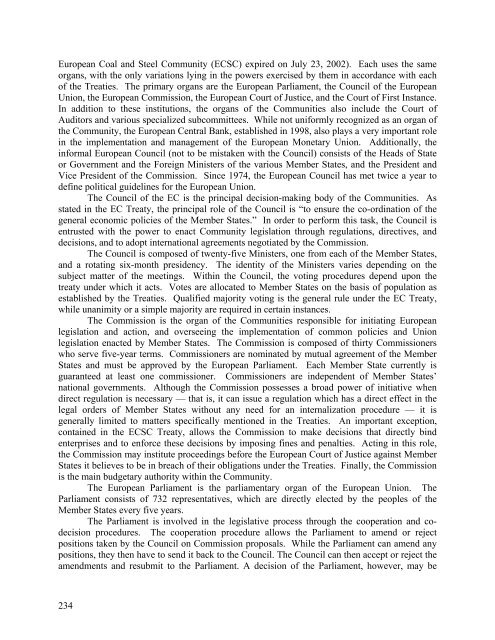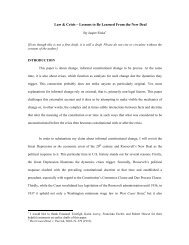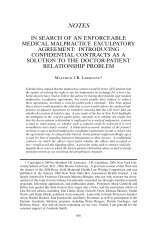Guide to Foreign and International Legal Citations - New York ...
Guide to Foreign and International Legal Citations - New York ...
Guide to Foreign and International Legal Citations - New York ...
Create successful ePaper yourself
Turn your PDF publications into a flip-book with our unique Google optimized e-Paper software.
European Coal <strong>and</strong> Steel Community (ECSC) expired on July 23, 2002). Each uses the same<br />
organs, with the only variations lying in the powers exercised by them in accordance with each<br />
of the Treaties. The primary organs are the European Parliament, the Council of the European<br />
Union, the European Commission, the European Court of Justice, <strong>and</strong> the Court of First Instance.<br />
In addition <strong>to</strong> these institutions, the organs of the Communities also include the Court of<br />
Audi<strong>to</strong>rs <strong>and</strong> various specialized subcommittees. While not uniformly recognized as an organ of<br />
the Community, the European Central Bank, established in 1998, also plays a very important role<br />
in the implementation <strong>and</strong> management of the European Monetary Union. Additionally, the<br />
informal European Council (not <strong>to</strong> be mistaken with the Council) consists of the Heads of State<br />
or Government <strong>and</strong> the <strong>Foreign</strong> Ministers of the various Member States, <strong>and</strong> the President <strong>and</strong><br />
Vice President of the Commission. Since 1974, the European Council has met twice a year <strong>to</strong><br />
define political guidelines for the European Union.<br />
The Council of the EC is the principal decision-making body of the Communities. As<br />
stated in the EC Treaty, the principal role of the Council is “<strong>to</strong> ensure the co-ordination of the<br />
general economic policies of the Member States.” In order <strong>to</strong> perform this task, the Council is<br />
entrusted with the power <strong>to</strong> enact Community legislation through regulations, directives, <strong>and</strong><br />
decisions, <strong>and</strong> <strong>to</strong> adopt international agreements negotiated by the Commission.<br />
The Council is composed of twenty-five Ministers, one from each of the Member States,<br />
<strong>and</strong> a rotating six-month presidency. The identity of the Ministers varies depending on the<br />
subject matter of the meetings. Within the Council, the voting procedures depend upon the<br />
treaty under which it acts. Votes are allocated <strong>to</strong> Member States on the basis of population as<br />
established by the Treaties. Qualified majority voting is the general rule under the EC Treaty,<br />
while unanimity or a simple majority are required in certain instances.<br />
The Commission is the organ of the Communities responsible for initiating European<br />
legislation <strong>and</strong> action, <strong>and</strong> overseeing the implementation of common policies <strong>and</strong> Union<br />
legislation enacted by Member States. The Commission is composed of thirty Commissioners<br />
who serve five-year terms. Commissioners are nominated by mutual agreement of the Member<br />
States <strong>and</strong> must be approved by the European Parliament. Each Member State currently is<br />
guaranteed at least one commissioner. Commissioners are independent of Member States’<br />
national governments. Although the Commission possesses a broad power of initiative when<br />
direct regulation is necessary — that is, it can issue a regulation which has a direct effect in the<br />
legal orders of Member States without any need for an internalization procedure — it is<br />
generally limited <strong>to</strong> matters specifically mentioned in the Treaties. An important exception,<br />
contained in the ECSC Treaty, allows the Commission <strong>to</strong> make decisions that directly bind<br />
enterprises <strong>and</strong> <strong>to</strong> enforce these decisions by imposing fines <strong>and</strong> penalties. Acting in this role,<br />
the Commission may institute proceedings before the European Court of Justice against Member<br />
States it believes <strong>to</strong> be in breach of their obligations under the Treaties. Finally, the Commission<br />
is the main budgetary authority within the Community.<br />
The European Parliament is the parliamentary organ of the European Union. The<br />
Parliament consists of 732 representatives, which are directly elected by the peoples of the<br />
Member States every five years.<br />
The Parliament is involved in the legislative process through the cooperation <strong>and</strong> codecision<br />
procedures. The cooperation procedure allows the Parliament <strong>to</strong> amend or reject<br />
positions taken by the Council on Commission proposals. While the Parliament can amend any<br />
positions, they then have <strong>to</strong> send it back <strong>to</strong> the Council. The Council can then accept or reject the<br />
amendments <strong>and</strong> resubmit <strong>to</strong> the Parliament. A decision of the Parliament, however, may be<br />
234
















